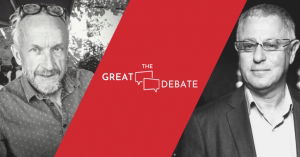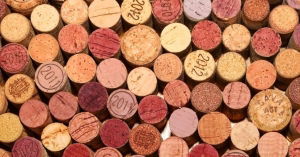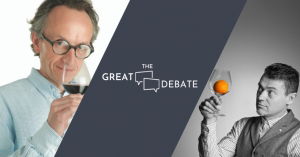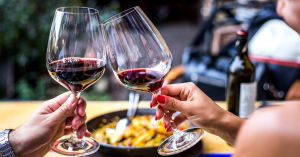BLOG
Wine Education & Careers
Pierre Freyermuth What is the Future of Appellations? with Andrew Jefford and Robert Joseph
KD: Andrew noted that without appellations — specifically European ones — the “global wine offer” would be simpler and that wine would have to rely more on marketing strategies. Do you agree, Robert, and secondly, would that be a good thing for wine consumers? Would it be more accessible to more...
Pierre Freyermuth What is the Future of Appellations? with Andrew Jefford and Robert Joseph
The Great Debate: What is the Future of Appellations? with Andrew Jefford and Robert Joseph KD: It would seem that with climate change, the notion of a wine region holding on to a rigid identity over the next several years or decades is borderline ridiculous. We need look no further than...
Pierre Freyermuth What is the Future of Appellations? with Andrew Jefford and Robert Joseph
The Great Debate: What is the Future of Appellations? with Andrew Jefford and Robert Joseph KD: One final question..., are we moving toward a future of appellation irrelevance? Has “the everyday consumer” already made them irrelevant? AJ: Not at all. Remember, as I outlined earlier, that...
Pierre Freyermuth What is the Future of Appellations? with Andrew Jefford and Robert Joseph
KD: Let’s shift gears and focus on what appellations have accomplished, and what role they might play in the preservation of wine heritage going forward. As an Italian wine fanatic, few things excite me more than geeking out over rare grape varieties that demonstrate something unique in the glass....
Pierre Freyermuth What is the Future of Appellations? with Andrew Jefford and Robert Joseph
KD: Let’s move on. While the EU wine quality pyramid for appellations (i.e. PDO/PGI) is intended to have some semblance of a hierarchy, all three of us could cite dozens of examples of exceptional, rule-breaking wines made as “table wine” or with a broadly generic regional appellation. Andrew, is...
Pierre Freyermuth What is the Future of Appellations? with Andrew Jefford and Robert Joseph
The Great Debate: What is the Future of Appellations? with Andrew Jefford and Robert Joseph KD: The original genesis of appellations was to place importance on “somewhereness,” but also to authenticate wine and guard against fraud. The desire for authentic wines and terroir has not gone away, and...
Pierre Freyermuth What is the Future of Appellations? with Andrew Jefford and Robert Joseph
KD: The natural wine movement in particular has challenged many tenets that appellations have held dear, namely ‘what is typicity?’ We discussed some of this in our last debate where some appellations have defined their wines by a set of standards which excludes some natural wines. So, is...
Pierre Freyermuth What is the Future of Appellations? with Andrew Jefford and Robert Joseph
KD: Let’s shift gears a bit. By their very construct, appellations are about controlling outcomes. Robert, do they control too much in the process of viticulture and winemaking? What should they control and what should they not control? RJ: The point of an appellation is to provide consumers with...
Pierre Freyermuth What is the Future of Appellations? with Andrew Jefford and Robert Joseph
KD: Let’s go back to something Robert suggested earlier: Do appellations really constrict freedom and inhibit creativity? Even if they do, is that a bad thing? RJ: If producers are allowed to produce the wines they want alongside AOP wines (as they have been for some time in Italy, for example),...
Kevin Day Wine Education & Careers
Few consumer products in the world are more steadfastly focused on origin than wine. Think of the last great bottle of wine you enjoyed and, odds are, its place of origin featured prominently on the label. Known as appellations, these defined areas of wine production have fostered a fanatical...
Lisa Airey Wine Education & Careers
Every wine appellation in France has a cahier des charges, a set of regulations that delineates the production zone and specifies viticultural practices and production standards. In many instances, a single cahier des charges references one zone of production and multiple wine styles within it...
Pierre Freyermuth Natural Wine feat. Andrew Jefford and Simon Woolf
KD: Separately, some natural wines have failed to qualify for their appellation status because they were deemed atypical of their region’s wines. Simon, what’s your opinion on the subject of typicity? Have regulators developed a taste for non-natural practices and allowed that to colour their...
Pierre Freyermuth Natural Wine feat. Andrew Jefford and Simon Woolf
KD: Do you see the coronavirus pandemic and its effect on the global wine market as changing the trajectory of natural wine in any way? AJ: Yes and no. Social distancing will be difficult for this movement, since it is very event-focused and venue-focused, a youthful community movement predicated...
Pierre Freyermuth Natural Wine feat. Andrew Jefford and Simon Woolf
KD: One of the most rancorous subjects in the debate is how much sulphur should be allowed. Simon: where do you stand on this issue? Is there a certain threshold where, consistently, sulphur interferes with the expression of a wine in your opinion? Or is that threshold more universal than personal...
Pierre Freyermuth Natural Wine feat. Andrew Jefford and Simon Woolf
KD: There also seem to be two currents flowing whenever natural wine is discussed. One is the fundamentals of making natural wine — organic and/or biodynamic viticulture, ambient yeast, minimal intervention in the winery. And then the other, for lack of a better word, is political. People are...
Pierre Freyermuth Natural Wine feat. Andrew Jefford and Simon Woolf
KD: Let’s shift gears and talk about flaws. Detractors of natural wine consistently point to flaws in the wine as their main point of criticism. Andrew: have people’s notions of what constitutes a flaw changed because of natural wine? Or have people lost sight of what a flaw is? AJ: I like this...
Pierre Freyermuth Natural Wine feat. Andrew Jefford and Simon Woolf
KD: How do you see natural wine and the question of terroir, Simon? SW: There are good and bad examples in any wine style or niche. Natural wine is no different. There are terrible Riojas made with oak chips and fruit that was half rotted, then there are divine examples that are amongst the...
Pierre Freyermuth Natural Wine feat. Andrew Jefford and Simon Woolf
KD: Can all regions and grape varieties be successful at making good natural wines? SW: I see no reason why not. When growers complain that they can’t convert to organic or biodynamic farming because their region is too cold or too wet, I just refer them to people like Aphros in Vinho Verde...
Kevin Day Wine Education & Careers
Wine is full of spirited debates, but few can argue that any subject matter generates more intensity these days than natural wine. Should sulphur be allowed or not? Do natural wines reveal terroir better than conventional wines? Has natural wine changed our notion of flaws? Perhaps most...
Rick Fisher Wine Education & Careers
Cosecha. Joven. Viejo. And the list goes on. Many wine-producing countries use local-language wine-related terminology without realizing their consumers are unaware of their meaning. Even native language speakers are sometimes confused by these terms as they are technical and/or relate to wine...




